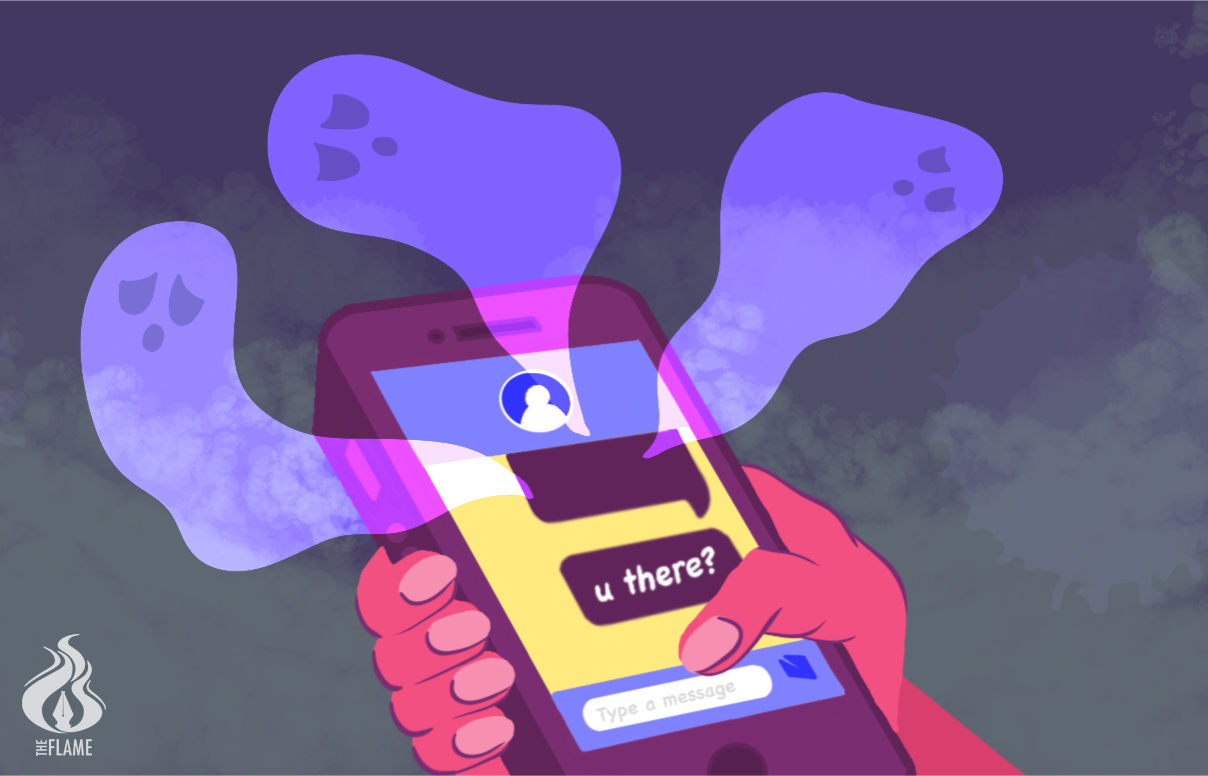
BAM’S* RELATIONSHIP with Belle* was going well. They would share life stories and experiences, bonding to the extent the virtual world could allow them. They were not officially dating, but according to the journalism junior, he thought it was “something.”
“Hi,” Bam sends enthusiastically.
An hour later, his phone rings with a “hello” floating on his lock screen. He quickly replies, asking Belle how she’s been.
Belle leaves the message on-read.
He sends a myriad of messages later on, of which half of them were left “seen” and the latter half—“delivered.” Bam was optimistic that the exchange would develop into something long-term.
All of this was for naught as Bam felt that Belle was slowly drifting away—until it finally happened. There were no fights, no misunderstanding—he just simply got cut off.
He was ghosted, and all that Bam has left are the memories he shared with Belle.
(My) Boo
With physical interactions reduced because of the pandemic, people resort to the internet in search of love or anything that passes off as love. They would swipe left and right on dating sites, hoping to match with “the one.”
It is fun and exciting, but nothing is without its pitfalls.
Enter the phenomenon: Ghosting
Many people have various reasons and motivations for ghosting people online, but one thing is for sure, the ghostee gets badly hurt.
Artlets are not exempt from this, as in the case of several AB students who either took the role of “ghoster” and/or “ghostee.” The Flame asked these artlets to share their stories on online love and to its end, heartbreak.
Liabilities and baggages
Philosophy sophomore Tin* is conflicted with ghosting.
She recounts the time where she had to ghost someone and she was not proud of it.
Tin and Dirk* had no problems in their relationship. All seemed fine—all too well—but deep inside, Tin did not feel right. So, then and there, she ghosted Dirk, believing it was for the best.
A year later, her sentiment deepened when Dirk told her about what he felt after being ghosted. Tin was aghast. She did not consider the magnitude of her actions.
Luckily for her, the guy understood that what she did was motivated by her childhood and parental issues.
“What I did was unjustifiable, rude, and disrespectful. Indeed my ghosting issues are rooted in parental issues,” she reflects. “However, nothing justifies leaving a person for absolutely no reason at all.”
From then on, she decided to veer away from relationships. For now, she only hopes for the day when she can finally take responsibility for her actions.
Repercussions
What if Karma exists?
Legal management junior Nesse* asks herself this as she recalls the time she ghosted Ter*. She remembers that it did not make much difference because Ter would always double-text and reply to her Instagram stories.
Nesse felt guiltier with every message Ter sent, but she still believes it is kinder to ignore his messages than give mixed signals.
Fast forward to the present: Nesse had a crush on this guy since her freshman year. But, in a fit of bad luck, he did not reciprocate her feelings. Like all stories like these go, Nesse was ghosted.
She never bothered to reach out again.
“I was hurt big time and embarrassed,” Nesse says. As a result, she questioned her self-worth and self-esteem—leaving a bad taste in her mouth. Even worse, the aftertaste of being ghosted was as cruel as the moment of ghosting.
Bam echoes Nesse’s feelings because after being ghosted, he began doubting his confidence and self-worth.
“Do you know the feeling that you are not that significant, and that’s why you can be cut off easily? That is how I felt, that I am a disposable piece of trash,” he says.
After that, he surrounded himself with good people, which helped him move on from Belle.
Ghosting explained
Behavioral science Asst. Prof. John Manuel R. Kliatchko said there are many reasons why people “ghost” their partners.
“The ghoster may have difficulty maintaining commitments in a relationship since the relationship was established online. There can be doubts about the seriousness of the ghoster’s intention, and [they] may not have the guts to formally initiate a closure,” he told The Flame.
Through a psychological lens, Kliatchko explains Bowlby’s attachment theory, which states that children’s experiences with their primary caregivers greatly impact how they build relationships later on. This concept could be applied to Tin’s parental reasons for ghosting Dirk.
Kliatchko also mentioned Mary Ainsworth’s description of attachment styles—secure, avoidant, and ambivalent attachment.
Kliatchko said ghosters would probably have an avoidant attachment style because they would rather leave relationships to avoid conflict. He adds that ghosting may also be a sign of low self-esteem because ghosters are afraid of rejection, opting to leave instead.
Regardless, Kliatchko assured “ghostees” that they are not at fault. In simple terms, they are ghosted simply because the ghoster is a ghoster.
“With the risks that go with online dating, why not meet people offline for a change?” Kliatchko said. F – with reports from Jan Oliver Malicse
* Real names of the students were hidden to protect their identities



